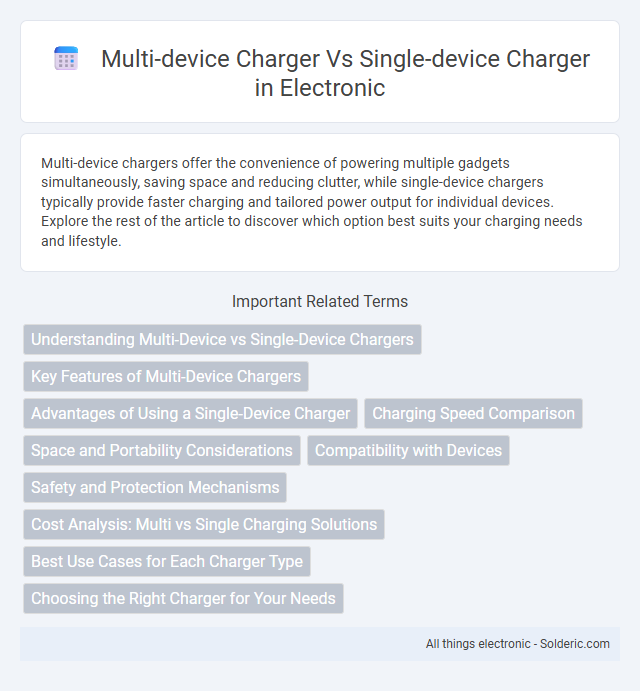Multi-device chargers offer the convenience of powering multiple gadgets simultaneously, saving space and reducing clutter, while single-device chargers typically provide faster charging and tailored power output for individual devices. Explore the rest of the article to discover which option best suits your charging needs and lifestyle.
Comparison Table
| Feature | Multi-device Charger | Single-device Charger |
|---|---|---|
| Device Support | Charges multiple devices simultaneously (phones, tablets, wearables) | Charges one device at a time |
| Port Availability | Multiple USB/USB-C ports (usually 3+) | Single USB/USB-C port |
| Charging Speed | Varies; may reduce speed if all ports in use | Optimized for one device; typically faster per device |
| Portability | Bulkier and heavier | Compact and lightweight |
| Power Output | Higher total wattage to support multiple devices (e.g., 60W-100W+) | Lower wattage focused on a single device (e.g., 18W-30W) |
| Price | Generally more expensive | More affordable |
| Use Case | Ideal for users with several devices or shared charging stations | Best for individual device charging or travel |
Understanding Multi-Device vs Single-Device Chargers
Multi-device chargers provide simultaneous charging capabilities for multiple gadgets, featuring higher power output and versatile port options such as USB-C, USB-A, and wireless charging pads, which optimize convenience and reduce clutter. Single-device chargers offer targeted power delivery optimized for one device, often resulting in faster charging speeds and compact design, ideal for travel or specific device compatibility like smartphones or laptops. Choosing between multi-device and single-device chargers depends on user needs for versatility, charging speed, and device management.
Key Features of Multi-Device Chargers
Multi-device chargers feature multiple USB ports and fast-charging capabilities designed to power smartphones, tablets, laptops, and other electronics simultaneously, eliminating the need for multiple outlets. They often include smart charging technology that detects the connected device's power requirements to deliver optimal charging speed while preventing overheating and overcharging. Compact, portable designs with universal compatibility and safety certifications make multi-device chargers ideal for home, office, and travel use.
Advantages of Using a Single-Device Charger
A single-device charger offers faster and more efficient charging by delivering the optimal power specifically designed for one device, reducing charging time and minimizing energy loss. It is typically more compact, lightweight, and portable, making it ideal for travel and easy storage. Additionally, using a dedicated charger reduces the risk of overheating or damaging the device, ensuring better battery health and longer device lifespan.
Charging Speed Comparison
Multi-device chargers typically offer lower charging speeds per device compared to single-device chargers due to shared power output across multiple ports. Single-device chargers deliver optimized wattage and voltage tailored to one device, enabling faster and more efficient charging sessions. Devices requiring rapid power replenishment benefit significantly from dedicated single-device chargers equipped with advanced fast-charging technologies like USB Power Delivery or Quick Charge.
Space and Portability Considerations
Multi-device chargers offer significant space savings by consolidating multiple charging ports into a single compact unit, ideal for limited desk or travel space. Single-device chargers are typically smaller and lighter, making them easier to carry but require multiple chargers for different devices, increasing overall bulk. For users prioritizing portability and minimal equipment, a multi-device charger reduces cable clutter and simplifies power management across smartphones, tablets, and laptops.
Compatibility with Devices
Multi-device chargers offer broad compatibility, supporting various smartphones, tablets, laptops, and wearables through multiple ports and wireless charging options. Single-device chargers are typically designed to optimize charging speed and power output for one specific device, often limiting their versatility. Choosing a multi-device charger enhances your charging convenience by enabling simultaneous compatibility with numerous gadgets, streamlining your power needs.
Safety and Protection Mechanisms
Multi-device chargers integrate advanced safety and protection mechanisms such as overvoltage protection, short-circuit prevention, and temperature control to safeguard all connected devices simultaneously. Single-device chargers often have simpler safety features tailored to one device, which may not address the complexities of charging multiple gadgets together. Choosing a multi-device charger with certified safety standards like UL or CE ensures reliable protection against electrical hazards for diverse electronics.
Cost Analysis: Multi vs Single Charging Solutions
Multi-device chargers typically offer a higher upfront cost but provide greater long-term savings by consolidating multiple charging needs into one unit, reducing the need for several separate chargers. Single-device chargers are more affordable initially but can lead to increased expenses over time due to purchasing multiple chargers for various devices and higher energy consumption. Your decision should consider both immediate budget constraints and overall efficiency to optimize cost-effectiveness.
Best Use Cases for Each Charger Type
Multi-device chargers are ideal for households or offices with multiple electronic devices, offering convenience and reducing cable clutter by charging smartphones, tablets, laptops, and wearables simultaneously. Single-device chargers excel in providing fast, optimized charging for one device, often supporting higher wattages and specialized technologies like Quick Charge or Power Delivery, making them perfect for users prioritizing rapid charging for a specific gadget. Choosing between these chargers depends on whether the primary need is simultaneous charging efficiency or maximizing the speed and performance for a single device.
Choosing the Right Charger for Your Needs
Choosing the right charger depends on your device count and usage patterns; multi-device chargers offer convenience by powering several gadgets simultaneously, reducing clutter with fewer outlets required. Single-device chargers provide optimized charging speeds and efficiency tailored for individual devices, often ideal for specific electronics like laptops or smartphones. Evaluating your daily charging demands alongside device compatibility ensures you select a charger that maximizes performance and convenience.
Multi-device charger vs Single-device charger Infographic

 solderic.com
solderic.com